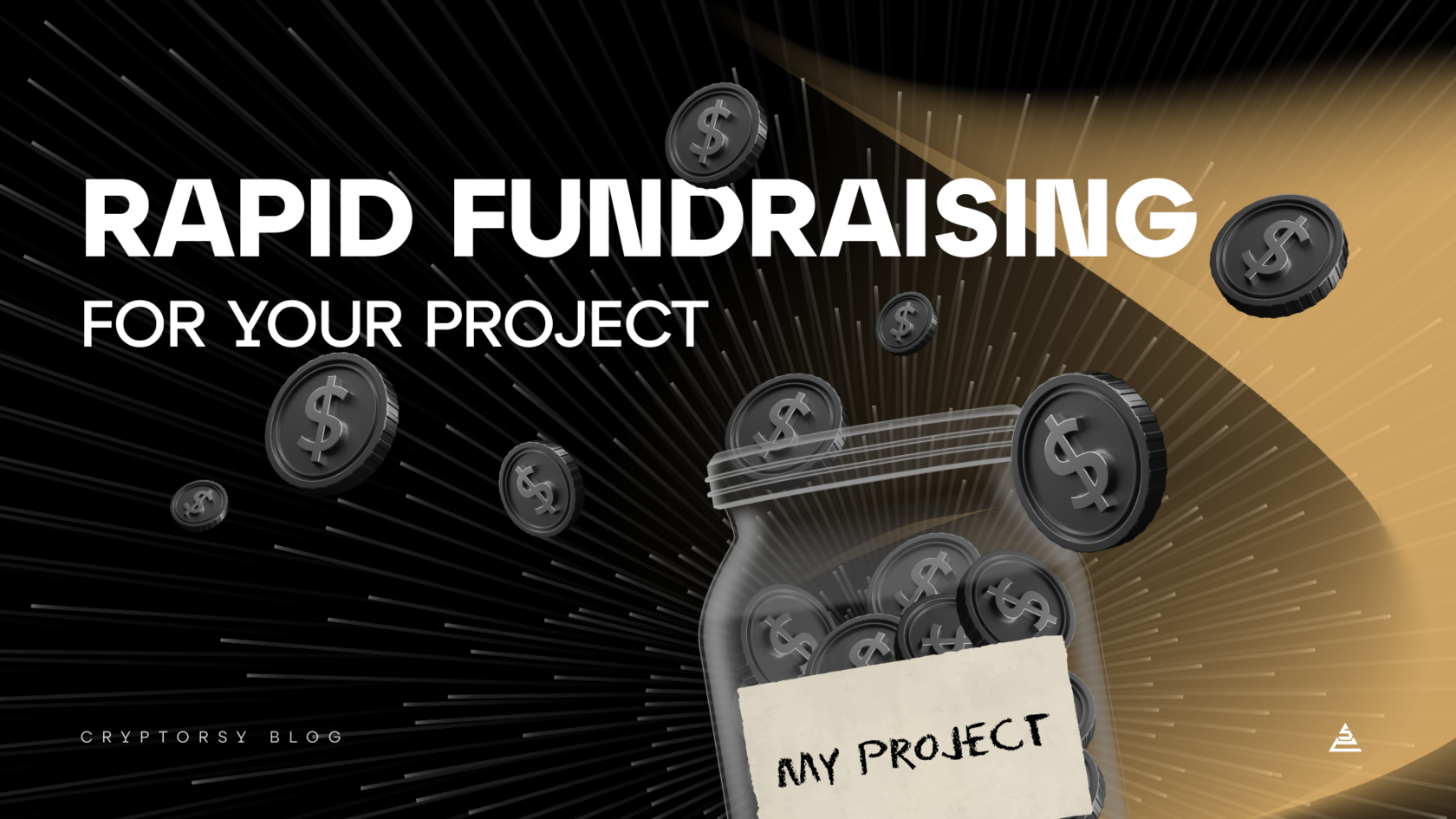
Rapid Fundraising for your Project
Hey, Cryptopreneurs!
Hello, and welcome to Cryptorsy Blog! Here we share our opinions, thoughts, experience, and prediction on different domains of the crypto industry. Ensure you read our other articles, too, to learn more.
Today, we'll discuss the best rapid methods to raise funds for your crypto project. We'll detail the procedures for raising funds for a cryptocurrency project, including documents needed to present to investors to convince them. We'll also talk about how to prepare for the collection of investments so that the funds fulfil their intended purpose – make a profit.
We'll ****round this discussion up by discussing the most important questions that interest investors.
Attain such worth that funds desire to invest in you, allowing you to select which one offers more than mere financial gain.
Let's get started.
Crypto project rapid fundraising has always been challenging for entrepreneurs, including those with big business ideas. This is because cryptocurrency is volatile, and people must be aware of blockchain technology. These factors make investors not believe in them.
Hello, and welcome to Cryptorsy Blog! Here we share our opinions, thoughts, experience, and prediction on different domains of the crypto industry. Ensure you read our other articles, too, to learn more.
Today, we'll discuss the best rapid methods to raise funds for your crypto project. We'll detail the procedures for raising funds for a cryptocurrency project, including documents needed to present to investors to convince them. We'll also talk about how to prepare for the collection of investments so that the funds fulfil their intended purpose – make a profit.
We'll ****round this discussion up by discussing the most important questions that interest investors.
Attain such worth that funds desire to invest in you, allowing you to select which one offers more than mere financial gain.
Let's get started.
Crypto project rapid fundraising has always been challenging for entrepreneurs, including those with big business ideas. This is because cryptocurrency is volatile, and people must be aware of blockchain technology. These factors make investors not believe in them.
Things to put in place before Businesses can seek Rapid Fundraising for their Projects
Brief History of Crypto Fundraising
Yes, at this stage, some companies may need fundraising to secure capital and money for the following developmental stages. They do this when they need more funds to optimize quickly compared with what they currently have. Due to this, about 90% of startups die at the fundraising stage without realizing their potential.
Let's briefly talk about the history of raising funds for Crypto
Let's briefly talk about the history of raising funds for Crypto
Communities
4. Organizing Meetings with Investors:
Most Important Questions that Interest Investors
In 2017, raising funds in the crypto space exploded. Many forecasters and members named it the Initial Coin Offerings craze (ICO). Countless projects blew up with ICOs, and most of them failed terribly.
Many analysts linked the ICO craze with the dot-com boom when numerous speculations resulted in a massive bubble in the late 1990s. The result, however, was that several new online companies failed. However, a few of the projects finished with making millionaires.
Pundits were ready for a similar collapse in 2017. However, it never happened. Instead, the ICO craze birthed numerous kinds of cryptocurrency finance. Among these are IEOS, STOs, and IDOs.
Many analysts linked the ICO craze with the dot-com boom when numerous speculations resulted in a massive bubble in the late 1990s. The result, however, was that several new online companies failed. However, a few of the projects finished with making millionaires.
Pundits were ready for a similar collapse in 2017. However, it never happened. Instead, the ICO craze birthed numerous kinds of cryptocurrency finance. Among these are IEOS, STOs, and IDOs.
Before businesses can obtain rapid fundraising for their projects, they first need to:
09.02.2023
Gleb Specter
6 min

RELATED
SUBSCRIBE TO OUR BLOG
3. Networking:
1. Learn How to sell the Idea:
Businesses must pack this Idea and then work on competently packaged documentation. Of course, you must first understand that at this stage, your product may still need to be prepared or is at the stage of early MVP. Therefore, you must learn how to sell the Idea itself.
Highlighted below are the documents needed to be put in place before pitching fundraising to investors:
WhitePaper: This is a technical document that details your project, and the problem it'll solve. It should also state why the team is qualified to solve the issues. Make sure it entails all the information that'll convince the potential investors to invest in the project.
The purpose of a whitepaper is to provide sufficient details to investors so they can trust the project since there's no regulator charged to verify.
PitchDeck: This is a clear and concise presentation of the overview of your project to the potential investor. Your pitch deck can be successful if you consistently pitch it to your potential investors and keep confidence in your communications.
Roadmap: This gives your potential investors what they should expect, and the years the project will take.
Highlighted below are the documents needed to be put in place before pitching fundraising to investors:
WhitePaper: This is a technical document that details your project, and the problem it'll solve. It should also state why the team is qualified to solve the issues. Make sure it entails all the information that'll convince the potential investors to invest in the project.
The purpose of a whitepaper is to provide sufficient details to investors so they can trust the project since there's no regulator charged to verify.
PitchDeck: This is a clear and concise presentation of the overview of your project to the potential investor. Your pitch deck can be successful if you consistently pitch it to your potential investors and keep confidence in your communications.
Roadmap: This gives your potential investors what they should expect, and the years the project will take.
Share this post:
2. Communication:
Secondly, you should use communication strategies to keep the crypto community lively and excite potential investors. Please share the details of your project development progression and prepare them for the Seed round long before hosting the PitchDeck.
Simple fact: People love investing in projects they've already heard about and see that active work is being done on it rather than investing in a project they heard about for the first time.
However, based on our survey, the seed round is often closed, thanks to investors with small investments - up to $300,000. But this does not mean you cannot use various launchpads and turn to VCs.
Simple fact: People love investing in projects they've already heard about and see that active work is being done on it rather than investing in a project they heard about for the first time.
However, based on our survey, the seed round is often closed, thanks to investors with small investments - up to $300,000. But this does not mean you cannot use various launchpads and turn to VCs.
Many companies always need to pay more attention to the roles that their social circles can play in raising funds. But it shouldn't be; many people in their environment, including relatives and friends, can be interested in their project and invest in it.
A sequel to the above next is to start and present your project to investors. It's paramount that companies pre-create a convenient communication channel, an online presence with investors, or a website where investors will receive up-to-date information about the project.
This will excite prospective investors who are yet to decide, and those who have already invested will be fully aware of the project's development.
Users can also build and promote the community. They can contact cryptocurrency influencers to check if they are interested in advancing their projects.
Now that we've discussed how you can rapidly fundraise for your project let's talk about the most important questions that interest investors.
This will excite prospective investors who are yet to decide, and those who have already invested will be fully aware of the project's development.
Users can also build and promote the community. They can contact cryptocurrency influencers to check if they are interested in advancing their projects.
Now that we've discussed how you can rapidly fundraise for your project let's talk about the most important questions that interest investors.
Above is a detailed blog about how to rapidly fundraise for your project. In it, we discussed the procedures and the document needed to present before potential investors to get convinced of your project. We also detailed some most asked questions on fundraising and more.
Stay tuned for our next material!
Stay tuned for our next material!
A community is an integral part of decentralized blockchain tech. Thus, it fuels investors' engagement. Investors will trust a project with a minimum of 100 community members more than those with lesser ones.
Yet, a company shouldn't drive bots into their communities as this may be a red flag if investors get to know that.
Expect to answer questions like "Do you have a community? How many people are there already supporting and following the project? How willing are they to support the project in the long term? How were these people gathered?" and lots more.
Yet, a company shouldn't drive bots into their communities as this may be a red flag if investors get to know that.
Expect to answer questions like "Do you have a community? How many people are there already supporting and following the project? How willing are they to support the project in the long term? How were these people gathered?" and lots more.
Team
In time past, companies gave investments to everyone who met them. The outcome, however, was that most are scammers. Due to this, investors are now checking the kind of people behind the project very carefully and whether they will disappear after receiving the money.
Potential investors may ask the team-related questions: "What kind of people are behind the project? What experience do they have? What did they do before, and what's their reputation in the niche? and more"
Potential investors may ask the team-related questions: "What kind of people are behind the project? What experience do they have? What did they do before, and what's their reputation in the niche? and more"
Business model
If there's one thing that investor wants to hear, it's "When will I return my investment, and how much will I earn on top?" This question should, however, be answered by an economic model worked out with laser precision.
Brief Summary
How much does it cost to cooperate with a crypto marketing agency?
The cost of using a crypto digital marketing company will vary depending on the size and scope of your campaign. However, we believe that our prices are very competitive and offer excellent value for money. If you would like a more accurate quote, please contact us and we will be happy to provide you with a customized proposal to fit your budget.
What are the best marketing channels for my crypto offering?
The best advertising and marketing channels are the ones that will allow you to reach your target audience most effectively within your budget. This will vary depending on your type of cryptocurrency project - whether it’s an ICO or a more well-established offering. However, some of the most popular marketing channels for crypto projects include the following:
- SEO & Content Marketing
- PPC Ads
- Social Ads
- PR & Outreach
- Influencer Marketing
- Online Communities
- Press releases
From what and how exactly we can start a collaboration?
Sure thing, we start with a briefing and underlining your goals, to make it our main focus in the work progress, then we’ll give you a couple of gifts (secret), connect your personal marketing manager to your project and launch campaigns. Just beep us on telegram @cryptorsy_io_bot , email us at hello@cryptorsy.io, leave your request here or book a call on our website. We have a principal position: what starts perfectly, will go on perfectly. So be sure, the process of work will be perfect in detail.
How I can be sure that you’ll deliver results?
As a team of data-driven crypto digital marketers, we place a strong emphasis on ROI. We believe that transparency is key — that's the reason we’ll always keep you up to date with our progress, so you can check out the results at any time.
Our combination of experience, expertise, and flexibility makes us some of the best crypto marketing experts in the industry. Here are some of the ways we ensure our clients get the best results:
Our combination of experience, expertise, and flexibility makes us some of the best crypto marketing experts in the industry. Here are some of the ways we ensure our clients get the best results:
- We have a team of experts who are solely focused on marketing cryptocurrency.
- We stay up to date with the latest industry news and trends.
- We develop creative solutions that are designed to help our clients overcome the unique challenges present in the world of cryptocurrency.
- We are always monitoring our campaigns to ensure they are delivering the desired results.
- We always remain agile and adapt our cryptocurrency strategies as needed.
- We offer competitive pricing to fit your budget without sacrificing quality.
What makes Cryptorsy unique and super valuable to me?
All our benefits: gifts, personal marketing manager, free audit, all services on a high-quality level, super easy-to-take prices, perfect scenario and funnels for result getting, and our powerful web3 network, that we can connect to you (all our relations and guys, that can strengthen your performance).
What do I get if I accept your offer, and what do I lose if I refuse?
Shortly, you’ll lose your dedicated crypto marketing partners that could bring you the highest results in the space because they’ve done this a million times, and why don't we do that with you?
What do you get? You get a successful marketing launch and sustainability in your future because 21+ TOP-level experts will manage your marketing activities!
What do you get? You get a successful marketing launch and sustainability in your future because 21+ TOP-level experts will manage your marketing activities!
Want to hack the stunning growth formula for your project? Our team has prepared something extremely special for you, just leave your application to get yours!
SCHEDULE YOR FREE CONSULTATION NOW












